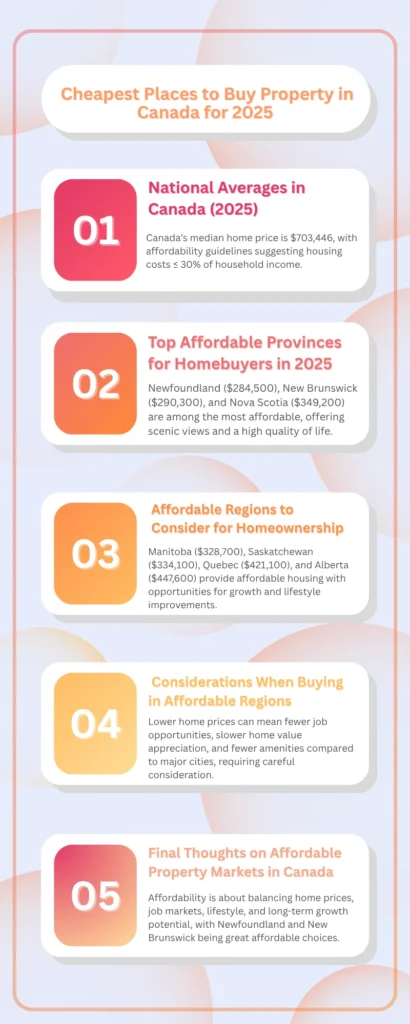15 Cheapest Province to Buy a House in 2025


Purchasing a home in Canada is often viewed as a key step toward achieving financial independence and long term security. It provides not just a place to live but also serves as an investment and a foundation for building wealth. However, as real estate prices surge and mortgage rates remain unpredictable, many Canadians are finding the path to homeownership increasingly difficult.
Fortunately, not every region is impacted equally. While some urban centers like Toronto and Vancouver remain among the most expensive in the country, several provinces and smaller cities continue to offer affordable housing opportunities. If you’re planning to buy property in 2025, here’s a detailed look at 15 areas that represent the cheapest province to buy a house in Canada, offering value, quality of life, and long term potential.
Table of Contents
ToggleNewfoundland and Labrador are frequently recognized as among the most budget friendly locations to purchase real estate in Canada. The province combines low home prices with a lower cost of living, making it ideal for first time buyers or those on a fixed income. In cities like St. John’s and Corner Brook, buyers can find spacious, well maintained homes at a fraction of the price seen in larger urban markets.
In particular, rural areas in the province offer some of the best deals in the country. The breathtaking natural beauty, friendly communities, and relaxed lifestyle further enhance its appeal. For those prioritizing affordability and quality of life, this region could be considered a cheapest province to buy a house in 2025.
New Brunswick remains one of the most cost effective provinces in Canada for homebuyers. Cities such as Fredericton, Saint John, and Moncton have thriving real estate markets with average home prices well below the national median. Moncton is especially attractive due to its economic growth and employment prospects.
Whether you’re a young family, a newcomer, or a retiree, the province offers a variety of property options, from modern townhomes to country houses. Its combination of affordability, livability, and access to natural beauty make New Brunswick a strong contender when evaluating the cheapest province to buy a house.
Nova Scotia offers both charm and affordability. While Halifax has seen moderate price increases in recent years, the surrounding towns and rural regions remain accessible. Communities such as Truro, Yarmouth, and New Glasgow offer reasonably priced homes in secure and friendly environments.
The province’s strong cultural heritage, beautiful coastline, and growing economy contribute to its popularity. For those who want to live near the ocean and enjoy a peaceful lifestyle, Nova Scotia stands out as a cheapest province to buy a house, especially in the outskirts of major centers.
Known for its postcard worthy landscapes and close knit communities, PEI continues to offer affordable housing in 2025. While Charlottetown’s real estate prices have climbed slightly, it still remains well below the national average.
Towns like Summerside and Montague provide great opportunities for budget conscious homebuyers. Add in high quality healthcare, good schools, and a stress free way of life, and it’s easy to see why PEI ranks high on the list of the cheapest province to buy a house in Canada.
With its blend of French heritage, diverse communities, and varying price points, Quebec offers something for everyone. Montreal and Quebec City are relatively expensive, but smaller cities such as Gatineau, Sherbrooke, Trois Rivières, and Rimouski offer excellent bargains.
Rural Quebec, in particular, remains incredibly affordable with properties suitable for both residential and vacation use. For buyers who value cultural depth, natural beauty, and low property prices, Quebec could be the cheapest province to buy a house for long term value.
Ontario is often associated with high real estate costs due to Toronto’s booming market, but several regions within the province remain affordable. Windsor, Sudbury, and Thunder Bay offer lower cost alternatives while still delivering good infrastructure, schools, and healthcare access.
These cities also feature growing job markets and economic development programs, making them great choices for both young professionals and families. If you want Ontario’s benefits without its high costs, consider these areas as part of the cheapest province to buy a house discussion.
Manitoba is one of Canada’s hidden gems when it comes to affordability. Winnipeg, the capital, has a strong job market, cultural diversity, and housing prices that are among the most reasonable for a major city.
Smaller towns around Winnipeg offer even more cost effective options with larger properties and quieter surroundings. Manitoba’s low taxes, efficient public services, and accessible mortgage programs place it firmly on the list of the cheapest province to buy a house in Canada.
Saskatchewan features consistently low property prices, particularly in cities like Saskatoon and Regina. Despite being urban centers, these cities offer single family homes and condos well below the national average, along with relatively low utility costs and living expenses.
The province’s economy is grounded in agriculture, energy, and mining, providing stable employment opportunities. For Canadians looking for both affordability and opportunity, Saskatchewan is undoubtedly among the cheapest provinces to buy a house.
Alberta’s real estate market is often overshadowed by Calgary and Edmonton, but numerous other cities offer great value. Lethbridge, Red Deer, and Medicine Hat are examples where homebuyers can find properties at very accessible prices.
These cities offer excellent quality of life, healthcare, and educational institutions. They’re also known for beautiful parks and outdoor recreation. When evaluating the cheapest province to buy a house, Alberta’s smaller cities offer some of the best opportunities for smart buyers.
Vancouver is well known as one of the priciest cities in North America, yet many other parts of British Columbia still offer affordable housing options. Cities like Prince George, Nanaimo, Kamloops, and Kelowna offer lower home prices without sacrificing access to stunning natural surroundings.
These locations appeal to retirees, remote workers, and families who want the benefits of BC’s climate and scenery. If you’re open to living outside the metropolitan core, British Columbia can still be considered in the cheapest province to buy a house conversation.
Southern Alberta, specifically areas like Lethbridge and Medicine Hat, provide ideal conditions for homebuyers. Property values are stable, neighborhoods are safe, and there’s easy access to both employment and recreational activities.
The pace of life is slower, and housing developments are growing steadily. These characteristics make Southern Alberta a region worth considering for those researching the cheapest province to buy a house with growth potential.
Northern Ontario offers some of the province’s lowest real estate prices. Towns such as North Bay, Timmins, and Thunder Bay allow buyers to own larger properties with land, often at a third of what you’d pay in Southern Ontario.
Access to healthcare, schools, and transportation remains strong, and the surrounding natural environment provides opportunities for hiking, fishing, and winter sports. This region certainly qualifies as a cheapest province to buy a house, especially for those desiring peace and space.
While Montreal is relatively expensive, its neighboring regions such as Laval, Longueuil, and Saint-Jean-sur-Richelieu offer a more affordable alternative. These suburbs give residents easy access to the city’s vibrant culture and economy without the high cost of downtown living.
This blend of suburban tranquility and urban convenience makes these areas some of the cheapest province to buy a house candidates for those who want the best of both worlds.
Outside of urban centers like St. John’s, rural Newfoundland offers exceptional value. Towns such as Gander, Stephenville, and Grand Falls Windsor provide large homes at incredibly low prices, often with scenic views and plenty of space.
These rural communities offer a slower pace of life, community spirit, and a safe environment. For many, this part of the country represents the cheapest province to buy a house for peaceful retirement or remote living.
Suburban areas near Halifax such as Dartmouth, Bedford, and Timberlea offer affordable alternatives to city center living. These areas are growing rapidly with new housing developments, schools, and transportation links.
The mix of affordability, accessibility, and Atlantic charm places Nova Scotia in the conversation for the cheapest province to buy a house, especially for those balancing work and family life.
As housing costs continue to rise in Canada’s major cities, many buyers are turning their attention to smaller provinces, towns, and rural areas. Whether you’re a first time buyer, retiree, or investor, knowing where to look can make all the difference.
From the coastlines of PEI to the prairie lands of Saskatchewan, there’s no shortage of affordable housing options. If you’re strategic and open to relocating beyond the big cities, finding the cheapest province to buy a house is not only possible it’s realistic in 2025.
Smart homeownership starts with knowing where to find value, and these 15 regions are a great starting point for any buyer looking to make a wise investment this year.